We’ve all been there—running late and trapped behind a red light, even though there’s little to no traffic flowing on the other side. This is made even more frustrating if it happens to be one of those traffic lights in your town or city that, for some reason, always remains red for what feels like much longer than normal.
This is because most traffic lights are programmed to change color based on predetermined rules and/or induction loop sensors embedded in the road. Luckily, researchers out there are working hard to make traffic lights artificially intelligent to keep traffic flowing smoother and more efficiently.
The study is part of Germany’s K14LSA project that’s funded by the German Federal Ministry of Transport and Digital Infrastructure and is supported by a number of partner organizations.
One of these partners, the Fraunhofer Institute for Optronics, System Technologies and Image Exploitation, installed high-resolution cameras and radar sensors at a high traffic street-light-controlled intersection in the city of Lemgo. The cameras were able to record the number of vehicles waiting for the lights to change, the amount of time each vehicle had to wait, and the average speed at which the vehicles went through the intersection.
The data that the cameras collected were then used to train a machine-learning-based computer algorithm, which then virtually experimented with other light-changing patterns that adapt to real-time traffic conditions. In this way, the algorithm would work out the best patterns for minimizing wait times.
According to these simulations, the best AI-based patterns could potentially improve traffic flow by 10 to 15 percent. However, the researchers say that the computer-generated simulations may not accurately reflect real-life conditions, so their next steps will be to use the algorithm on real traffic lights over the next few months.












